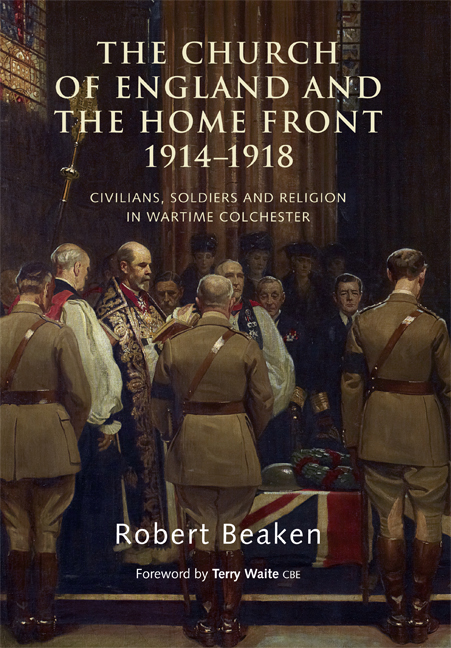 The Church of England and the Home Front, 1914-1918
The Church of England and the Home Front, 1914-1918 Book contents
- Frontmatter
- Dedication
- Contents
- List of Illustrations
- Foreword
- Author’s Acknowledgements
- 1 The First World War – One Hundred Years On
- 2 Colchester
- 3 Wartime
- 4 The Clergy
- 5 The Laity
- 6 Prayer and Worship
- 7 The National Mission of Repentance and Hope
- 8 Thought and Attitudes
- 9 Armistice, Remembrance and Aftermath
- 10 The Church of England and the First World War
- Bibliography
- Index
3 - Wartime
Published online by Cambridge University Press: 11 May 2021
- Frontmatter
- Dedication
- Contents
- List of Illustrations
- Foreword
- Author’s Acknowledgements
- 1 The First World War – One Hundred Years On
- 2 Colchester
- 3 Wartime
- 4 The Clergy
- 5 The Laity
- 6 Prayer and Worship
- 7 The National Mission of Repentance and Hope
- 8 Thought and Attitudes
- 9 Armistice, Remembrance and Aftermath
- 10 The Church of England and the First World War
- Bibliography
- Index
Summary
In order to understand and appreciate the ministry of the parish churches of Colchester during the First World War, it is necessary to set their wartime experiences in context. No two English towns or cities experienced the First World War in exactly the same way, though anxiety, bereavement, shortages and the widespread dislocation of daily life were universal. Additionally, Colchester's experiences during the First World War were strongly influenced by the town's geographic position in eastern England, the presence of the garrison and the social composition of the town's population.
Geography and Fear of Invasion
Throughout the First World War, the military and civil authorities and ordinary people of Colchester were highly conscious of their town's proximity to the North Sea, and thus to the ever-present menace of the Imperial German Navy, especially after the German bombardment of Great Yarmouth, Scarborough, Hartlepool and Whitby in November and December 1914. In May 1915, the townsfolk were disturbed by rumours that HMS Recruit had been sunk off nearby Clacton-on-Sea, and East Anglia was declared a ‘danger zone’. On many occasions throughout the war, the sound of artillery fire from France was clearly audible in Colchester, which people found unsettling.
Colchester was in the path of German bombers heading for London and was itself frequently bombed during the war. One of the first bombs fell on 21 February 1915 on Butt Road, where it damaged several houses, mangled a perambulator (mercifully empty of its baby) and narrowly missed ammunition in the nearby ordnance depot. Enterprising locals sold toys fashioned from the debris, and Lady Colebrooke generously replaced the perambulator. Later in 1915, five German Zeppelins were seen over the town. In 1916 the Zeppelin L33 was brought down at Little Wigborough. In a scene worthy of an Ealing comedy, the Zeppelin crew were arrested by a special constable on a bicycle and taken to Colchester for interrogation. Other wartime bombing went unmentioned in Colchester's newspapers as a result of press censorship.
A rigid blackout was instituted throughout Colchester, the town hall clock was silenced, and at times it was forbidden to ring church bells, so that German aircraft flying at night would not realise they were over a town.
- Type
- Chapter
- Information
- The Church of England and the Home Front, 1914-1918Civilians, Soldiers and Religion in Wartime Colchester, pp. 30 - 53Publisher: Boydell & BrewerPrint publication year: 2015


